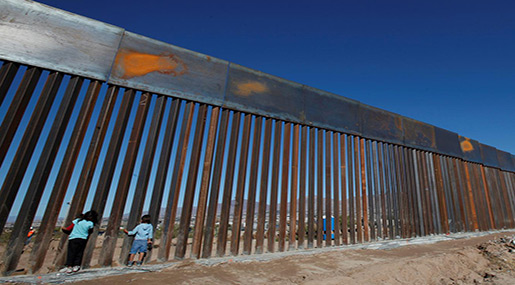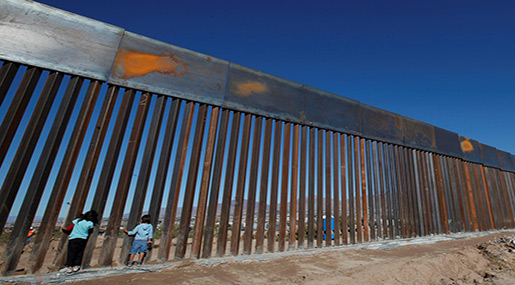
Trump Forced To Sign Budget That Doesn’t Include His Promised Wall

Andrew Taylor
Donald Trump has signed a $1.1 trillion spending bill to fund the Government for the remainder of the fiscal year. It includes no money for a Mexican border wall, despite it being one of the biggest promises of his campaign.

White House spokeswoman Sarah Huckabee Sanders, speaking to reporters at a regular media briefing, confirmed the president had signed the bill.
The bill cleared both houses of Congress this week and Trump signed it behind closed doors at his home in central New Jersey, ahead of a midnight deadline for some government functions to begin shutting down. But other battles over government spending lie ahead. Among those are the border wall, as well as a promised military buildup.
Negotiators on the bill dropped Trump's demands for a down payment on his oft-promised wall along the US-Mexico border, but his signature buys five months of funding stability while legislators argue over the wall and over Trump's demands for a huge military buildup matched by cuts to popular domestic programs and foreign aid accounts.
The House passed the measure Wednesday on a big bipartisan vote, though 103 of the chamber's conservative Republicans opposed the bill. The White House and its GOP allies praised $15 billion in additional Pentagon spending obtained by Trump and $1.5 billion in emergency border security funds but was denied funding to begin construction work on the border wall.
"After years of an administration that failed to get serious on border security, this bill provides the largest border-security funding increase in a decade," said Senate Majority Leader Republican Mitch McConnell, a key negotiator.
And Democrats and the pragmatic Republicans who negotiated the bill successfully defended other accounts targeted by Trump such as foreign aid, the Environmental Protection Agency, support for the arts, and economic development grants, among others.
The sweeping, 1,665-page bill also increases spending for NASA, medical research, and the FBI and other federal law enforcement agencies.
Democrats also praised the measure as an example of bipartisan cooperation in the handling of the 12 annual appropriations bills that fund the federal government. It reflects bipartisan culture among congressional appropriators, who long ago sorted out many of the spending fights Trump wants to renew this summer - over foreign aid, funding for the arts, Amtrak subsidies, grants to state and local governments, and development agencies like the Appalachian Regional Commission.
"On a bipartisan basis, we rejected President Trump's ill-considered proposal to slash domestic programs by $15 billion, including deep cuts for NIH and low-income energy assistance. Instead, this bill includes a $2 billion increase for the National Institutes of Health," said a top Democratic negotiator, Senator Pat Leahy of Vermont, who called the bill "a good deal for the American people."
Trump took to Twitter earlier this week to complain about the bipartisan process that produced the measure but changed course to crow about additional spending for the military and border security. The White House has said he'll sign the bill.
One of Trump's tweets advocated for a "good shutdown" this fall to fix the "mess" that produced the bill, though he appeared at the White House just hours later to boast that it was a big win for him.
Congressional Republicans - motivated in great measure by fear of a politically damaging government shutdown - worked closely with minority party Democrats to produce the measure, which made only small changes to most accounts covered by the measure.
But many rank-and-file Republicans saw the bill as a lost opportunity for a fight that could have produced victories on the wall and punishing "sanctuary" cities that fail to cooperate with immigration authorities.
"It is a win for Democrats and a loss for conservatives," said tea party Representative Dave Brat "We have a Republican in the White House and control of both chambers of Congress yet this legislation fails to include key conservative reforms Republicans have long-advocated."
Even supporters of the bill dislike the secretive, closed-door negotiations that produced it and delivered it seven months behind schedule while denying anyone the opportunity to amend it.
"Is there any member of the United States Senate that has read this?" asked Senator John McCain of Arizona. "And many of us are going to be compelled to vote for it because we don't want to shut the government down."
The signing by Trump came as twelve athletes began swimming across the border from the United States to Mexico in an effort to call attention to immigrants.
The swimmers kicked off their journey from the city of Imperial Beach, California, and headed south toward a fence that juts into the Pacific Ocean. Kayakers paddled alongside for safety. Mexican immigration officials and schoolchildren prepared to greet them on a beach in the border city of Tijuana.
Supporters held on to the swimmers' passports during the 6.2 mile swim.
Organizer Kim Chambers of New Zealand insisted the swim isn't a protest against President Donald Trump's border wall or government policy but says an air of "negativity" after last year's US elections was the catalyst.
Source: AP, Edited by Website team
Comments



